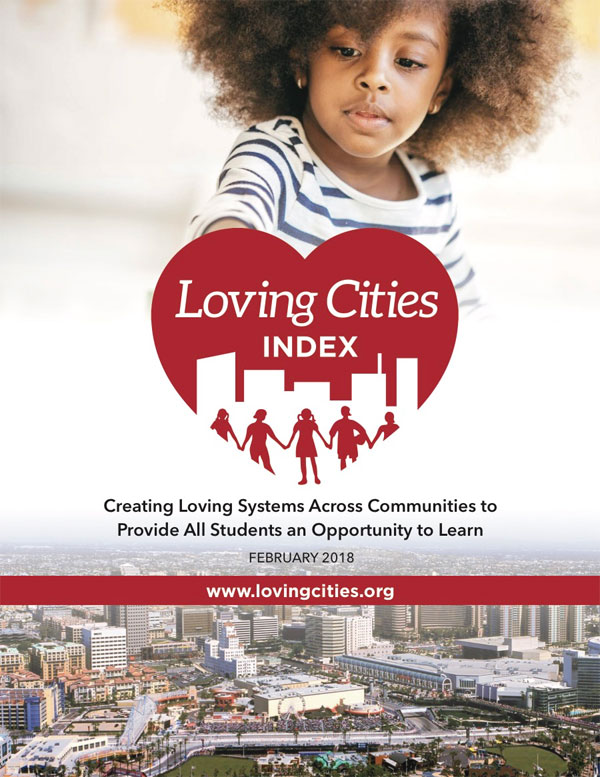News
Local Leaders Play Critical Role to Drive U.S. Toward More Loving and Just Society

 Today, we have more information available than ever before to understand the state of our cities. An exciting new addition, the Loving Cities Index recently launched by the Schott Foundation, measures how well cities are doing at creating loving systems that provide children and families with the resources and supports they need to have the opportunity to learn and succeed. Schott researched 24 indicators of access to opportunities and disaggregated the data by race to examine differences across 10 cities.
Today, we have more information available than ever before to understand the state of our cities. An exciting new addition, the Loving Cities Index recently launched by the Schott Foundation, measures how well cities are doing at creating loving systems that provide children and families with the resources and supports they need to have the opportunity to learn and succeed. Schott researched 24 indicators of access to opportunities and disaggregated the data by race to examine differences across 10 cities.
This latest research underscores the grim reality that we still face great challenges. In cities across the country, many working people are struggling against high levels of poverty (individuals working full time and earning less than 200% of the federal poverty guidelines), an affordable housing crisis, and persistent racial and economic segregation within communities and schools. Loving Cities Index research reveals that on average local systems are still only delivering between 30-50% of the supports children need to have a fair and substantive opportunity to learn and thrive.
Fortunately, we also know a lot about what it takes to foster loving, supportive local systems:
- Local leaders present our best opportunity for progress. They can disproportionately impact the specific systems for children and families to receive basic resources and supports. Although the 10 cities profiled in the Loving Cities Index span different geographies, population sizes/demographics, and political leanings, in each there were positive instances of success and innovations in local systems to deliver health and livelihood supports that increase the likelihood that a child will grow up in a healthy living and learning climate. Popular models like school-based health clinics and Community Schools (which transform traditional schools into community hubs for extended learning and access to resources and supports) were conceptualized and developed locally in cities, and over time expanded throughout states due to their success and popularity. These critical collaborations did not come from federal policy – instead they can be attributed to the persistence of local officials, administrators, teachers and social workers who have worked tirelessly together to understand the unique barriers to access and developed highly localized strategies to connect people with resources they need.
 Local government must be a player in social change. At Living Cities, a decade of work with cross-sector tables in communities across the country focused on expanding economic opportunity has taught us that it matters who has a seat at the problem-solving table. Local government is one of the most influential actors in peoples’ day-to-day lives, and it has the steady resources, convening power and innate ability to scale up solutions that many non-profits struggle to create for themselves. From supporting entrepreneurs of color and promoting economic growth, to removing barriers in policy and process that create an environment where everyone can thrive, local government is a critical and underinvested in partner in the work of creating thriving cities.
Local government must be a player in social change. At Living Cities, a decade of work with cross-sector tables in communities across the country focused on expanding economic opportunity has taught us that it matters who has a seat at the problem-solving table. Local government is one of the most influential actors in peoples’ day-to-day lives, and it has the steady resources, convening power and innate ability to scale up solutions that many non-profits struggle to create for themselves. From supporting entrepreneurs of color and promoting economic growth, to removing barriers in policy and process that create an environment where everyone can thrive, local government is a critical and underinvested in partner in the work of creating thriving cities.- We must address racial inequities head-on. Across almost every indicator of well-being people of color suffer worse outcomes—a devastating reminder that we have failed to undo the legacy of racist policies and practices from our history that, too often, continue to be reproduced in systems today. By disaggregating data by race, the Loving Cities Index assesses how well communities are truly providing opportunities for all young people to thrive. Problem-solving with a lens of racial equity is critical for moving beyond Band-Aid fixes that may actually widen gaps to attacking inequality at its roots. One of today’s most promising trends is the growing network of community leaders across the country who are building their own competencies to apply this lens to their work, and then working together to unlock the potential for systems change. In Cleveland, more than 2700 leaders have built these competencies. New Orleans has trained 1,200 leaders across the for-profit, philanthropic, nonprofit and government sectors.
As our national debates descend into increasingly acrimonious divides, communities are calling on local leaders to be the primary drivers of change towards more civil, equitable and just communities. In a stark contrast to the role that the federal government has played in the past to protect local civil rights, neither the current federal administration nor Congress is championing civil and human rights or ensuring substantive opportunities for working people. Local community leaders and elected officials must work together to play that vital role, driving more local system innovations and collaborations to address some of the most persistent opportunity gaps.
Each one of us can get more involved locally to advance opportunity in our communities, ultimately contributing to moving the needle nationally. It’s on each of us to participate in local elections, join public or private cross-sector collaborations, and engage in robust dialogues on what our communities must do to change systems to meet the needs of all children and families.
For more resources and tools for creating change locally go to: https://www.livingcities.org/resources



